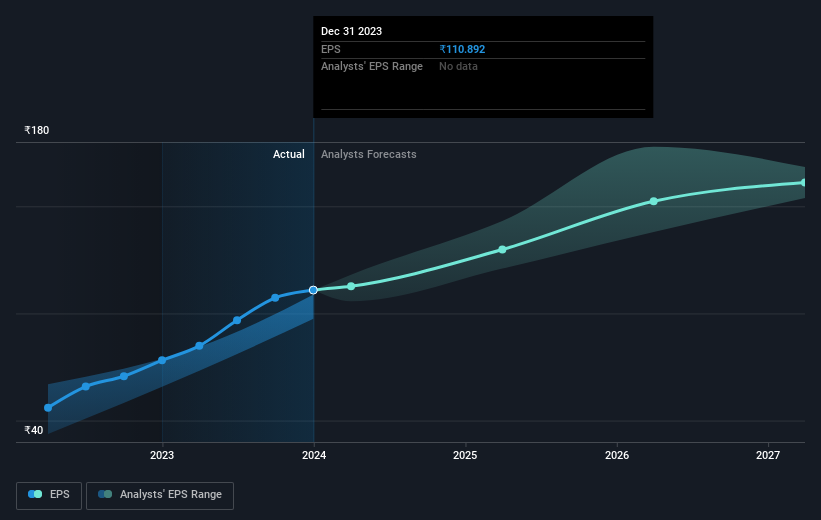Stock Analysis
- India
- /
- Electrical
- /
- NSEI:POLYCAB
Polycab India (NSE:POLYCAB) jumps 6.2% this week, though earnings growth is still tracking behind five-year shareholder returns

Buying shares in the best businesses can build meaningful wealth for you and your family. While not every stock performs well, when investors win, they can win big. For example, the Polycab India Limited (NSE:POLYCAB) share price is up a whopping 775% in the last half decade, a handsome return for long term holders. And this is just one example of the epic gains achieved by some long term investors. It's also good to see the share price up 29% over the last quarter. Anyone who held for that rewarding ride would probably be keen to talk about it.
Since it's been a strong week for Polycab India shareholders, let's have a look at trend of the longer term fundamentals.
Check out our latest analysis for Polycab India
In his essay The Superinvestors of Graham-and-Doddsville Warren Buffett described how share prices do not always rationally reflect the value of a business. One way to examine how market sentiment has changed over time is to look at the interaction between a company's share price and its earnings per share (EPS).
Over half a decade, Polycab India managed to grow its earnings per share at 24% a year. This EPS growth is slower than the share price growth of 54% per year, over the same period. So it's fair to assume the market has a higher opinion of the business than it did five years ago. And that's hardly shocking given the track record of growth. This optimism is visible in its fairly high P/E ratio of 50.56.
The graphic below depicts how EPS has changed over time (unveil the exact values by clicking on the image).

We know that Polycab India has improved its bottom line lately, but is it going to grow revenue? This free report showing analyst revenue forecasts should help you figure out if the EPS growth can be sustained.
What About Dividends?
As well as measuring the share price return, investors should also consider the total shareholder return (TSR). The TSR incorporates the value of any spin-offs or discounted capital raisings, along with any dividends, based on the assumption that the dividends are reinvested. So for companies that pay a generous dividend, the TSR is often a lot higher than the share price return. We note that for Polycab India the TSR over the last 5 years was 801%, which is better than the share price return mentioned above. The dividends paid by the company have thusly boosted the total shareholder return.
A Different Perspective
It's nice to see that Polycab India shareholders have received a total shareholder return of 77% over the last year. Of course, that includes the dividend. That gain is better than the annual TSR over five years, which is 55%. Therefore it seems like sentiment around the company has been positive lately. In the best case scenario, this may hint at some real business momentum, implying that now could be a great time to delve deeper. I find it very interesting to look at share price over the long term as a proxy for business performance. But to truly gain insight, we need to consider other information, too. For example, we've discovered 2 warning signs for Polycab India (1 makes us a bit uncomfortable!) that you should be aware of before investing here.
If you would prefer to check out another company -- one with potentially superior financials -- then do not miss this free list of companies that have proven they can grow earnings.
Please note, the market returns quoted in this article reflect the market weighted average returns of stocks that currently trade on Indian exchanges.
Valuation is complex, but we're helping make it simple.
Find out whether Polycab India is potentially over or undervalued by checking out our comprehensive analysis, which includes fair value estimates, risks and warnings, dividends, insider transactions and financial health.
View the Free AnalysisHave feedback on this article? Concerned about the content? Get in touch with us directly. Alternatively, email editorial-team (at) simplywallst.com.
This article by Simply Wall St is general in nature. We provide commentary based on historical data and analyst forecasts only using an unbiased methodology and our articles are not intended to be financial advice. It does not constitute a recommendation to buy or sell any stock, and does not take account of your objectives, or your financial situation. We aim to bring you long-term focused analysis driven by fundamental data. Note that our analysis may not factor in the latest price-sensitive company announcements or qualitative material. Simply Wall St has no position in any stocks mentioned.
About NSEI:POLYCAB
Polycab India
Polycab India Limited manufactures and sells wires and cables under the POLYCAB brand in India and internationally.
Flawless balance sheet with solid track record.

